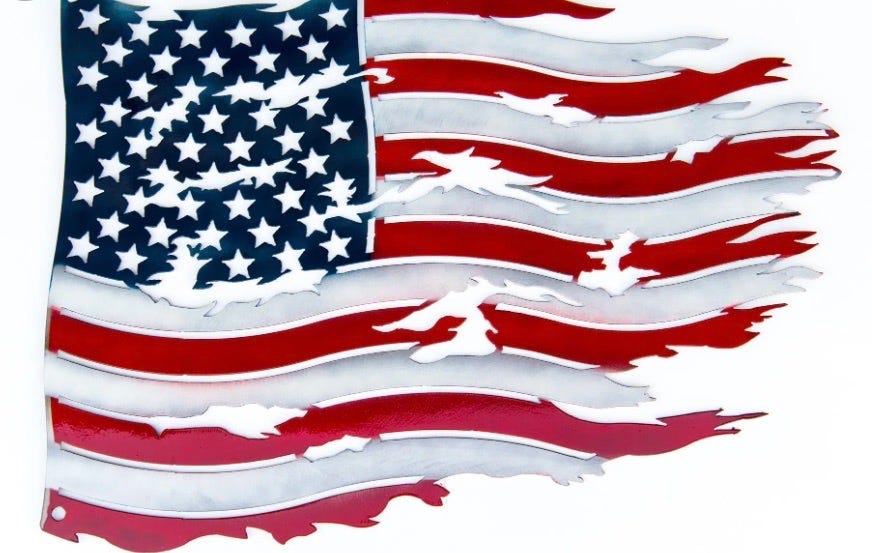Democracy Imperiled
“Democracy cannot succeed unless those who express their choice are prepared to choose wisely. The real safeguard of democracy, therefore, is education.” - Franklin D. Roosevelt
“The church is supposed to direct the government. The government is not supposed to direct the church. That is not how our Founding Fathers intended it.” - Rep. Lauren Boebert (R-CO)
These two statements provide vivid evidence of an education crisis in America. Knowledge about and confidence in our civic institutions are at critically low levels.
Lauren Boebert is far from alone.
In a recent interview, Sen. Tommy Tuberville (R-AL) said, “Our government wasn’t set up for one group to have all three branches of government — wasn’t set up that way. You know, the House, the Senate, and the executive.”
A mock exam conducted by The Woodrow Wilson National Fellowship Foundation in 2018 revealed that 2/3 of Americans could not pass the United States Citizenship Test. Even worse, 81% of those under age 45 failed.
60% don’t know how many justices sit on the Supreme Court. Only 24% know why the colonists fought the British. And just for humor, 2% believe climate change caused the Cold War.
The statistical evidence of decline is accompanied and exacerbated by a deepening ideological chasm and a persistent attack on the public education system itself. The ideological rift is illustrated by the contrasting approaches embodied in the 1619 Project and the 1776 Curriculum.
The 1619 Project is based on a book by Nikole Hannah-Jones with a related curriculum promoted by the New York Times. The 1619 Project aims to “ . . . reframe the country's history by placing the consequences of slavery and the contributions of Black Americans at the very center of the United States.”
The 1776 Curriculum was generated by the ultra-conservative Hillsdale College as a response to the 1619 Project. The 1776 Curriculum rejects the premises of the 1619 Project and seeks to reassert the idea of American Exceptionalism and to relegate slavery and racism to a sidebar in a grand and noble narrative. A major presence on the ideological battlefield, Hillsdale College is behind a mushrooming network of Hillsdale Classical Schools.
The ideological tension has coincided with educational policies that emphasize mathematics and English over all else. Beginning with a 1983 report titled A Nation At Risk, education has been dominated by testing and accountability. In the predictable frenzy of testing to which children have been subjected, civics, the arts, creativity, imagination and critical thinking have been neglected.
A national effort to undermine public education has been underway for decades. Much of this campaign has been funded by wealthy, conservative groups, the Walton (Walmart) family prominent among them. The most visible manifestations have been sprawling networks of charter schools and political movements supporting vouchers and school choice.
Voucher programs and school choice are also diverting public funds to religious schools, a scheme that seemed unconstitutional on its face until the recent Supreme Court ruling in Carson v. Makin which seems to fill the separation of church and state with cement.
The charter school movement was originally intended to offer freedom for innovation, providing models for broader school improvement. The movement was quickly subsumed within the broad effort to undermine and erode the traditional public system. Many charter schools, especially in vulnerable urban communities of color, have been corrupt and incompetent.
Most recently, the parents’ rights movement has further splintered the notion of a common foundation on which to build an engaged citizenry. If the Woodrow Wilson report is accurate, 81% of these parents can’t pass a basic citizenship test. And they would like control over the curriculum!
The decline in civics education is acutely exacerbated by the changed media environment. In years past, most Americans received information from common and trusted sources. Differences of opinion were at least based on stipulation to the facts.
This is no longer the case and has led to both irreconcilable divisions and a troubling loss of faith in our system of governance. These divisions are dangerously partisan. Consider these findings from a New York Times/Siena College poll:
92% of Democrats believe that former president Trump threatened democracy with his post-election actions. Only 19% of Republicans believe that to be true.
61% of Republicans believe Trump won the 2020 election.
48% of Americans between 18-29 believe voting doesn’t matter.
Only 34% of Americans are confident that major newspapers and television stations are accurate and fair.
Only 7% get information from a major newspaper; 1% from a local paper.
58% of those polled believe our constitutional democracy no longer works.
In a frayed and fragile democratic society, a rededication to civics education must be accompanied by education in media literacy. If citizens are unable to distinguish between the truth and partisan fiction, they cannot discharge their democratic responsibilities, no matter their knowledge of the system itself.
In 19th century United States, Horace Mann championed civics instruction in a free public system as necessary to unify heterogeneous groups of students. If we are to believe, as Horace Mann implored us, that public education must be a unifying force that establishes a common foundation from which to exercise self-governance, we are in deep trouble.
If we are this profoundly divided on the truth of our past it is difficult to imagine unity on the possibilities for our future.
(This post is a distillation of my long-form piece in Yellow Scene magazine) https://yellowscene.com/2022/08/29/the-case-for-civics-education-what-you-dont-know-can-hurt-you/


